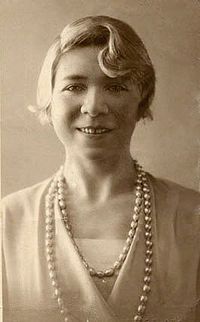Featured Poem: They’ve Come by Alfonsina Storni

Our Featured Poem this week takes us to another completely different time and place in history with Alfonsina Storni's They've Come.
Born in Switzerland in 1892, Alfonsina Storni was to become on the most important Argentine and Latin-American poets of the modernist period.
Her family moved back to Argentina when she was just four years old, her Italian-Swiss parents had founded a brewery in San Juan some years before and settling in Rosario in 1901, her father opened a tavern when Storni would grow up doing various chores.
She joined a travelling theatre at just 15 years old, performing Henrik Ibsen's Spectres, Benito Perez Galdo's La Loca de la Casa and Florencio Sanchez's Los Muertos all over the country. She briefly returned to live with her mother, who had remarried, in 1908 but after just a year she moved to Coronda to train as a primary school teacher. It was during this time that she began writing for local magazine and the prestigious Mundro Argentino.

She continued to supplement her teaching work with newspaper journalism when she moved to Beunos Aires in 1912. She had reportedly moved to the big city seeking anonymity, and the following year her son Alejandro was born, the illegitimate child of a journalism in Coronda.
She published her first collection of poetry La Inquietud del Rosal (The Restlessness of the Rosebush) in 1916 and began moving in literary circles which in part inspired the shift to more realist and feminist themes in her work. Her 1920 book Languidez was met with great critical acclaim.
After publishing Ocre in 1920 however she suffered intently from solitude and feeling marginalised, her poor mental health forced her to leave her teaching job. She would go on to publish five more works, including two plays, between 1926 and 1938, with trips to Europe influencing her writing with more dramatic lyricism.
However by October 1938 she was suffering so intently form solitude and breast cancer than Storni sent her final poem Voy a Dormir (I'm Going to Sleep) into La Nacion newspaper and around 1am on the 25th of October, she headed toward the sea at La Perla Beach in Mar del Plata in Argentina. Her body was found by two workers the following morning, washed up on the beach.
Her death inspired composer Ariel Ramirez and lyricist Felix Luna to compose the song Alfonsina y el Mar (Alfonsina and the Sea), which has been performed by many great singers and musicians over the years.
They've Come
Today my mother and sisters
came to see me.
I had been alone a long time
with my poems, my pride . . . almost nothing.
My sister---the oldest---is grown up,
is blondish. An elemental dream
goes through her eyes: I told the youngest
"Life is sweet. Everything bad comes to an end."
My mother smiled as those who understand souls
tend to do;
She placed two hands on my shoulders.
She's staring at me . . .
and tears spring from my eyes.
We ate together in the warmest room
of the house.
Spring sky . . . to see it
all the windows were opened.
And while we talked together quietly
of so much that is old and forgotten,
My sister---the youngest---interrupts:
"The swallows are flying by us."
Alfonsina Storni
Share
Related Articles

Storybarn Book of the Month: Saving the Butterfly
This month, as part of Refugee Week (16-22 June), we've been taking a look back at one of our favourites…

June’s Stories and Poems
This month we are celebrating the natural world, and especially the many wonderful creatures that live within it, with June’s…

April’s Monthly Stories and Poems
Our year of Wonder with The Reader Bookshelf 2024-25 is coming to a close – though we won’t be putting…


